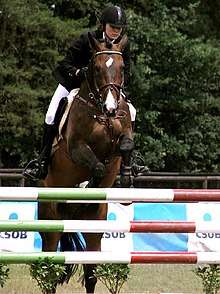Czech Warmblood
The Czech Warmblood, Czech: 'Český teplokrevník', is the warmblood sport horse of the Czech Republic.[1]
 Czech Warmblood jumping | |
| Other names | Czech: Český teplokrevník |
|---|---|
| Country of origin | Czech Republic |
Characteristics
The Czech Warmblood is a robust, powerful horse bred with strong bones. The breed has a strong neck on an elegant body, a broad, long back, and good hooves, though they are sometimes flat. The mane and tail are very thick.
The Czech Warmblood is a relatively long-lived, unpretentious and relentless horse. The breed is willing and teachable with a very good temperament. Most are black, chestnut, bay or dark bay.
Breed history
The Czech Warmblood was in existence by the time of the Austro-Hungarian Empire (1876-1918). In the 19th century the breed was influenced by Spanish and Italian horses, and later by breeds such as the Furioso, Gidran, Nonius and Przedswit (horse) breeds. German Warmblood horses also played a part.
The most famous and successful line is the Bystrý. The founder was Stallion 469, foaled in 1919. The line is characterized by a robustness, shorter and a less solid run, steeper and a shorter fetlock. They are mainly bay horses.
The stud farm in Kladruby plays a major role in the breeding of the Czech Warmblood. In the pedigree book, many other breeds are mentioned, for example Thoroughbred, Selle Francais, Arabian and Anglo-Arabian.
Uses
Czech Warmbloods are suited to all horse sports. They are good at dressage and horse racing and are also capable of lighter farm and forest work, hunting and jumping.
In 2013 the population was reported as about 22,000.[1]
References
- Breed data sheet: Cesky teplokrevnik/Czech Republic. Domestic Animal Diversity Information System of the Food and Agriculture Organization of the United Nations. Accessed May 2015.
External links
- Short description (in Czech)